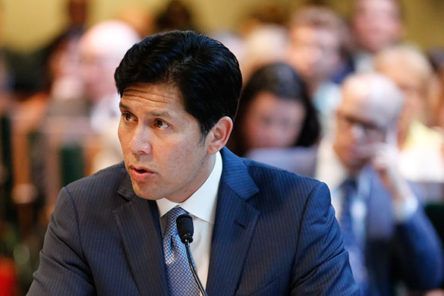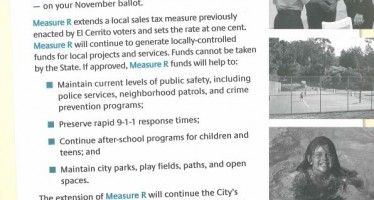Secure Choice retirement program up against powerful federal law
 An unprecedented state law meant to create 401(k)-style retirement accounts for millions of private-sector workers in California now faces a daunting obstacle to ever being implemented: one of the most powerful federal laws on the books.
An unprecedented state law meant to create 401(k)-style retirement accounts for millions of private-sector workers in California now faces a daunting obstacle to ever being implemented: one of the most powerful federal laws on the books.
Under the state law establishing the California Secure Choice Retirement Savings Program, after it is phased in, all companies with five or more workers which do not have retirement benefits eventually would have to withhold 3 percent of worker pay and send it to the state government, with the funds to be invested in safe financial instruments such as U.S. treasuries. Workers could opt out.
The proposal was championed by state Senate President Kevin de León (pictured), D-Los Angeles, with strong support from state Treasurer John Chiang. They depicted it as crucial to helping 7 million Californians working in jobs without retirement benefits to prepare for retirement.
But the Republican-controlled Congress recently passed, and President Trump subsequently signed, a law overturning an order issued last August by the Obama administration’s Department of Labor that exempted Secure Choice-type programs from the Employee Retirement Income Security Act (ERISA), a landmark 1974 law that established strict standards for retirement plans and their management. This erased legal concerns raised by pension lawyers aware of ERISA’s intricacies.
Yet at a news conference last week, de León and Chiang downplayed the significance of the lost ERISA exemption. They said they had only sought the federal action in response to concerns raised by the California Chamber of Commerce and the California Manufacturers and Technology Association – not because of a concern that Secure Choice would be subject to ERISA.
That’s not the conclusion one would be likely to gather after reading the language of Senate Bill 1234, the de León bill establishing Secure Choice that was signed by Gov. Jerry Brown in September. It makes specific reference to the ERISA exemption: “The United States Department of Labor has finalized a regulation setting forth a safe harbor for savings arrangements established by states for nongovernmental employees for the purposes of the federal Employee Retirement Income Security Act.”
And it says the Secure Choice governing board “shall not implement the program … if it is determined that the program is an employee benefit plan under the federal Employee Retirement Income Security Act” – which it now appears to be.
ERISA expert notes scope of landmark 1974 law
However, de León and Chiang cited a 2016 opinion from the K&L Gates law firm that sees no ERISA compliance problem. But the opinion is based on an earlier version of the bill – not the measure that passed and seemed built on the assumption that Secure Choice was only legal with the ERISA exemption.
In a March analysis released as the bill to overturn the exemption was advancing through Congress, the National Public Pension Coalition’s program manager, Tyler Bond, suggested courts might rescue Secure Choice-type laws by deciding ERISA doesn’t apply. But Bond’s background is as a communications specialist, not the law.
Michael A. McKuin, a Palm Desert lawyer who specializes in ERISA, notes on his website the long history of courts broadly interpreting ERISA’s scope because of the law’s sweeping language: “The provisions of … this chapter shall supersede any and all state laws insofar as they may now or hereafter relate to any employee benefit plan.”
McKuin writes: “In determining whether a plan is governed by ERISA, courts have generally followed the approach of the Eleventh Circuit in Donovan v. Dillingham, 688 F.2d 1367 (11th Cir. 1982) (en banc). Under the Dillingham test, an ERISA plan exists if a reasonable person can ascertain: (1) the intended benefits, (2) intended beneficiaries, (3) the source of financing, and (4) the procedures for receiving benefits. … The purported plan need not be formal or written to qualify as an ERISA benefit plan, but rather, the court must look to the ‘surrounding circumstances’ to see if the four factors have been met.”
“As a practical matter, it does not take much to satisfy the test and Courts will generally find the existence of an ERISA plan even where no such plan is wanted by anyone,” McKuin writes – unless the plan has the “safe harbor” specifically mentioned in SB 1234’s ballot language.
Chris Reed
Chris Reed is a regular contributor to Cal Watchdog. Reed is an editorial writer for U-T San Diego. Before joining the U-T in July 2005, he was the opinion-page columns editor and wrote the featured weekly Unspin column for The Orange County Register. Reed was on the national board of the Association of Opinion Page Editors from 2003-2005. From 2000 to 2005, Reed made more than 100 appearances as a featured news analyst on Los Angeles-area National Public Radio affiliate KPCC-FM. From 1990 to 1998, Reed was an editor, metro columnist and film critic at the Inland Valley Daily Bulletin in Ontario. Reed has a political science degree from the University of Hawaii (Hilo campus), where he edited the student newspaper, the Vulcan News, his senior year. He is on Twitter: @chrisreed99.
Related Articles
Trump establishes commanding lead in recent Golden State poll
With California’s delegate-rich primary election looming for Republicans as a possible last chance to stop Donald Trump from rolling
Despite crackdown, is state losing ground in vaccination push?
Four years into a crackdown on high numbers of California students going unvaccinated because of claimed concerns over vaccine risks,
Is local tax measure success a sign of things to come?
As usual, Michael Coleman’s California City Finance website has an excellent recap of local tax measures and how they fared in




